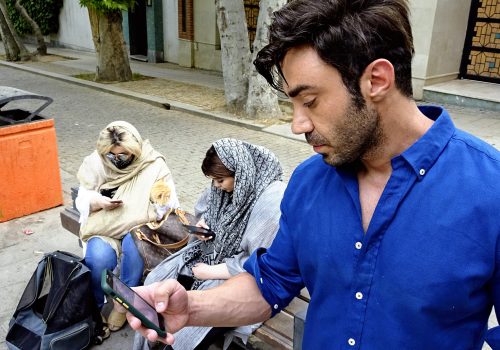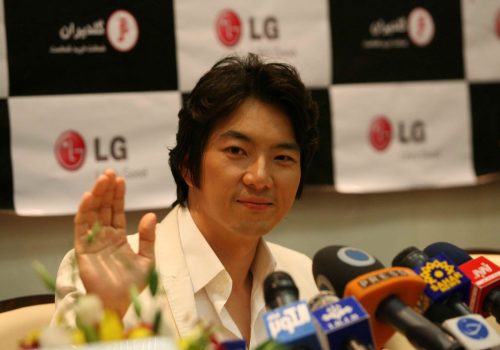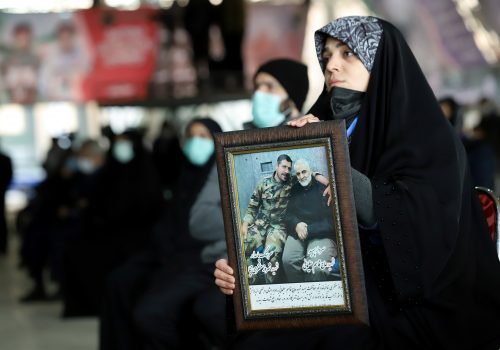Ayatollah Ahmad Jannati may outlive all of us—even the Angel of Death
“The Angel of Death’s decisive message to Ayatollah Ahmad Jannati: ‘I swear to God, if I can’t get you this year, I will resign,’” went one of the many jokes circulating on Persian language social media upon news of his re-selection on July 16 as chairman of the influential Guardian Council.
The announcement came after much speculation that Jannati, 95, would finally step down. Since 1988, he has led the twelve-member vetting body of clerics and lawyers, which is tightly controlled by Supreme Leader Ayatollah Ali Khamenei and oversees everything from screening candidates for elected office to vetting legislation.
If the hardline chairman manages to finish his latest six-year term in 2028, Jannati will be 101 years old, making him the oldest cleric to serve on the Guardian Council in the Islamic Republic’s forty-three-year history.
The Supreme Leader’s decision to keep Jannati and two other aging clerics—Mohammad Reza Modarresi Yazdi and Mahdi Shabzendedar—on the Council demonstrates Khamenei’s desire to maintain control by like-minded conservatives despite widespread criticism of the vetting body’s bias and performance over the years.
Jannati wears many turbans
Jannati has been a fixture of the Islamic Republic since its inception. Over the past four decades, he has held many roles, including a member of the Guardian Council since 1980 and member of the Assembly of Experts since its establishment in 1983. Jannati also chairs that eighty-eight-member body, which acts similar to the Roman Catholic College of Cardinals in selecting the next Supreme Leader (and even has the ability to depose him).
Jannati, who is well-known for his anti-Western views, is a founding member of the hardline Haqqani seminary school in Qom, which has fostered numerous high-ranking figures of the Islamic Republic. Alumni have served in the Islamic Revolutionary Guard Corps (IRGC), Judiciary, Intelligence Ministry, and other key positions.
Not surprisingly, Jannati has sometimes put the Islamic Republic’s perceived needs before those of his own family. In 1982, his son, Hossein Jannati, a member of the People’s Mojahedin Organization of Iran (Mujahedin-e Khalq), a militant opposition group that fell out with the regime after the 1979 revolution, was killed by the IRGC in a street clash. Jannati never publicly expressed remorse for his son’s death.
Jannati was also closely associated with hardline President Mahmoud Ahmadinejad (2005-2013). During 2009 post-election protests that became known as the Green Movement, protesters chanted, “Damn you Jannati, you’re an enemy of the nation!”
In 2014, Jannati compared the leaders of the Green Movement—Mir Hossein Mousavi, Zahra Rahnavard, and Mehdi Karroubi—who have been under house arrest since 2011, with Italian fascist Benito Mussolini. Jannati went as far as saying that they should be executed without a trial. In 2017, referring to the Green Movement leaders, Jannati described the roots of “sedition” as still being strong within the Islamic Republic.
In January 2020, under Jannati’s watch, more than 14,000 parliamentary candidates were disqualified by the Guardian Council, including ninety then-serving MPs in a move seen as a push by Khamenei to install a hardline-led parliament. A day before the elections, on February 20, 2020, the US Treasury Department sanctioned Jannati for “preventing free and fair elections in Iran.”
That same year, then-parliamentarian Ali Motaheri called on Jannati “to step down from God’s position,” after the Guardian Council dismissed parliament’s decision not to amend an election law that added the IRGC to the list of official entities that have a say in choosing election candidates.
In the 2021 presidential elections, the Guardian Council used its most drastic vetting yet, disqualifying almost all reformist and centrist presidential candidates—including former Speaker of Parliament Ali Larijani and First Vice President Eshaq Jahangiri—and leaving mostly hardline candidates to run. That left all branches of the government, including the judiciary, in hardline hands. Thus the system fell in line with the Supreme Leader’s vision for a “second phase” of the Islamic Revolution, where critical voices are eliminated.
Age ain’t nothing but a number
Hardliners were quick to point out on social media that there wasn’t much of an age gap between Jannati and US President Joe Biden, 79 (one noted that Jannati was merely a teenager when Biden was born). Additionally, hardliners noted the one-year age difference with Queen Elizabeth II, who just celebrated her platinum jubilee—her seventieth year on the British throne.
“Why don’t they talk about the sanity of the 96 year old Queen of England, but the survival of 95 year old #Jannati is considered extraordinary!?” tweeted an offended Iranian.
State media commentator Hossein Sarmi tweeted that he asked someone on the Guardian Council if Jannati was still diligent about his work, and the person replied, “Believe it or not, he has greater motivation and makes more effort to serve the revolution than us young people.”
This echoes what the spokesman of the Guardian Council, Abbas Ali Kadkhodaei, who has worked with Jannati closely for two decades, had to say. Kadkhodaei told Hamshari newspaper: “There are also jurists and lawyers who have more of a history of cooperation with Ayatollah Jannati than me. All the jurists and lawmakers who are in contact with him acknowledge his high political intelligence and his pursuits in political affairs.”
In 2018, parliament passed the “Law Banning the Employment of Retired Individuals,” which effectively would bar elderly people from political office. It’s evident that the law isn’t being implemented. Apparently, senior officials have stepped in to keep ailing officials in power in a number of key bodies, from the Supreme Council of National Security to the Oil Ministry, and the Iranian Atomic Energy Organization (IAEO), with the Supreme Leader, in some cases, giving his stamp of approval after officials asked for exemptions.
Khamenei has his own motivations for keeping clerics like Jannati around—and not just because they’re his contemporaries.
With the Guardian Council creating a unitary system of hardliners, Khamenei seeks to counter criticism not just from ordinary citizens—due to corruption, mismanagement, economic demise, and general discontent—but from within the clerical establishment as well.
Ironically, Jannati has been vocal about one of Iran’s main problems: the country’s wealth disparity. On the eve of the Iranian New Year in March, he warned that “It would be a miracle if we can feed the hungry bellies.” But this criticism, which is in line with Khamenei’s constant messaging, should be viewed skeptically as an attempt to offload blame.
There also appears to be a reluctance to allow a new generation of clerics to take the helm, even though the Supreme Leader has spoken of a vision for an Islamic Revolution 2.0: a clerical establishment made up of the relatively young and pious. Inertia seems to have set in as top-ranking clerics are uncomfortable with leaving their seats of influence and appear unsure what to do after occupying significant seats for much of their lives.
With Jannati continuing his role, Khamenei is solidifying his control on power and trying to ensure a like-minded successor. For many of Iran’s youth, however, this just reinforces their sense of alienation with the Islamic Republic and makes geriatric clerics like Jannati appealing only as a punch line.
Holly Dagres is editor of the Atlantic Council’s IranSource blog, and a nonresident senior fellow with the Middle East Programs. She also curates The Iranist newsletter. Follow her on Twitter: @hdagres.
Further reading
Tue, May 24, 2022
The Biden administration needs to do more on Iran. Here’s why.
IranSource By Holly Dagres
Having a consistent, actionable approach to Iran is what the Biden administration needs to stay on course with its human rights agenda. Now is a good place to start.
Wed, Oct 27, 2021
Iranians give ‘Squid Game’ the green light
IranSource By Holly Dagres
With "Squid Game" becoming a global phenomenon, it’s no surprise that it’s also gaining popularity in Iran. But the Iranian fascination with the show comes at a time when Iran and South Korea are having their own drama.
Fri, Jan 1, 2021
The Qasem Soleimani assassination feels like ages ago—but Iran hasn’t forgotten
IranSource By Holly Dagres
A year after Quds Force commander Qasem Soleimani’s death, Iranians haven’t forgotten—and the Iranian government will make sure that they don’t.
Image: Ayatollah Ahmad Jannati (R), a candidate for the upcoming vote on the Assembly of Experts, and Iran's former chief negotiator Saeed Jalili attend a conservatives election campaign gathering in Tehran February 24, 2016. The campaign gathering was titled "No to UK Meddling". REUTERS/Raheb Homavandi/TIMA


